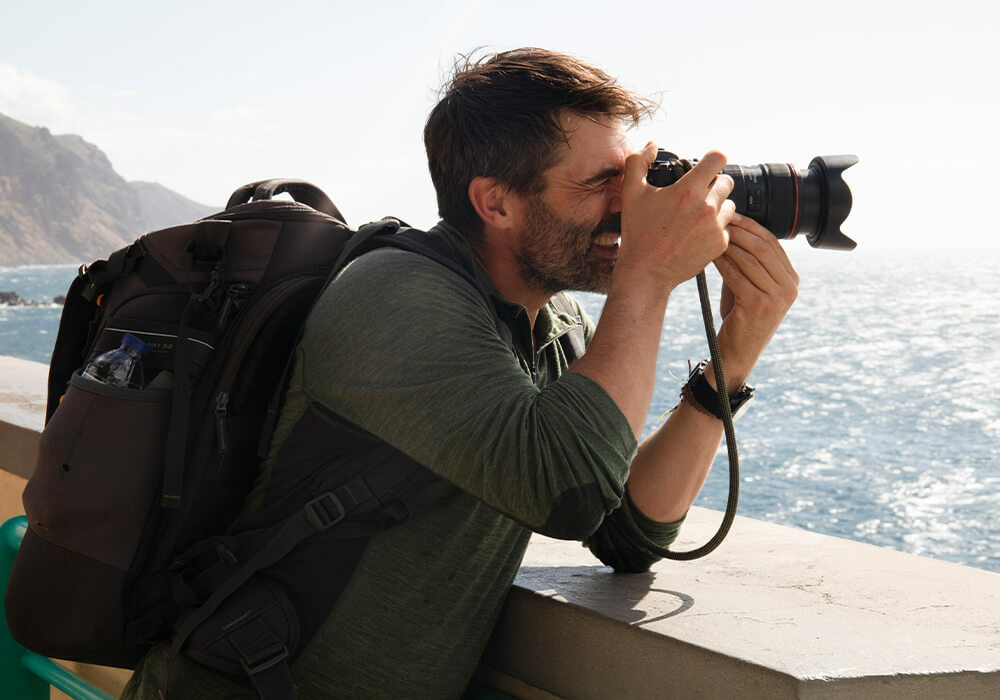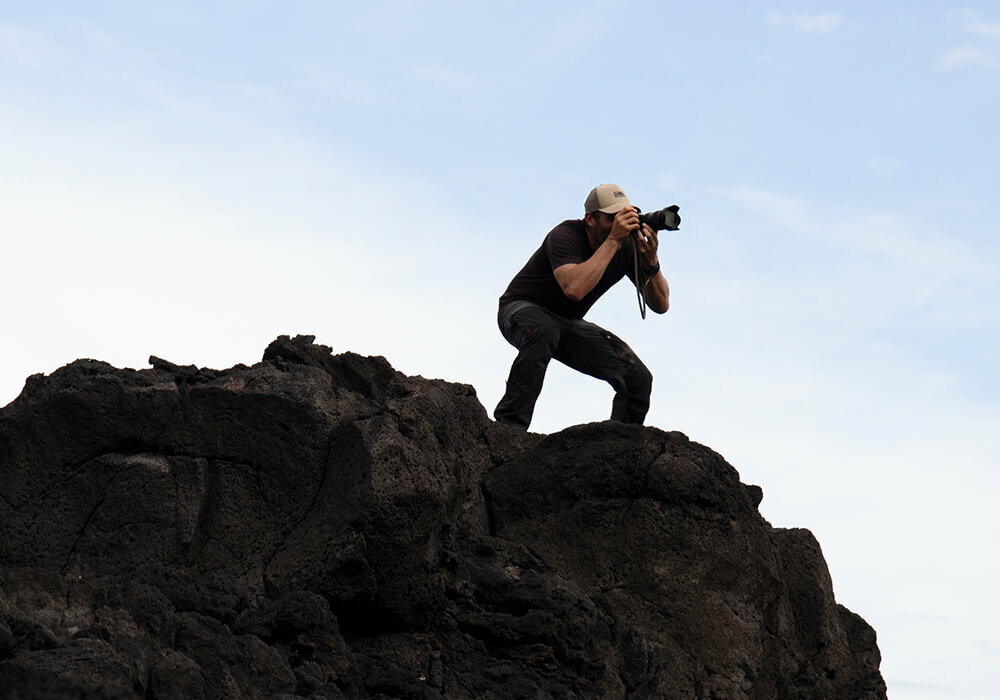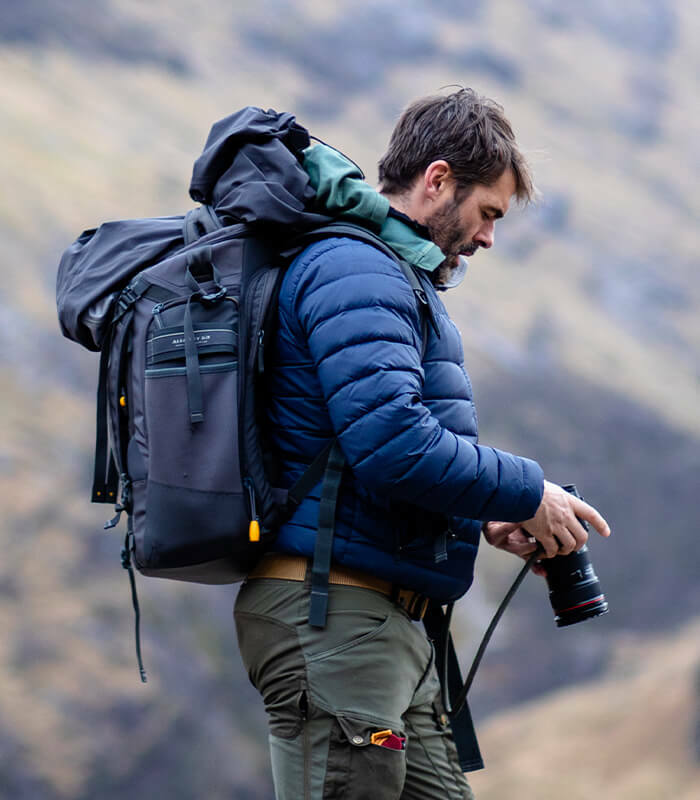14th Mar 2024
Behind the Lens with Ian Finch
An interview with Rohan’s location photographer Ian Finch about his career and journey into the profession.
14th Mar 2024
An interview with Rohan’s location photographer Ian Finch about his career and journey into the profession.
Ian Finch is an adventure and outdoor brand photographer, expedition guide, Explorer Club member, and a former Royal Marines Commando. He’s also been Rohan’s location-based photographer of choice for the last three years. In that time, he’s captured some truly incredible shots of both our clothing, and the breathtaking landscapes we visit. We sat down with Ian to find out more about his career, his work with outdoor brands, and his journey to becoming a professional photographer.
Ian’s passion for adventure and the outdoors is clear from the outset. His genuine reverence for the natural world and the indigenous people that inhabit it comes through in every story and image that he captures.
What was it like transitioning from the military into a more creative career?
I’ve always been a creative person. Photography and music have always been at the heart of what I love to create. What drew me towards working in the forces was a combination of my love for the outdoors and the physicality of the work. The experiences I had while serving really moulded me into who I am today. I became fascinated with pushing my physical and mental limits. I wanted to explore how far I could go.
After spending about four years in the Marines, I decided to retrain in health and fitness as an instructor. I also studied the psychology side and looked into sports nutrition. I didn’t realise it at the time, but this is what started moving me towards getting into outdoor leading and guiding. Thinking about it now, it seems like a natural progression. But back then I had no idea that this would be the destination.
But I still had the itch to push and challenge myself. That Marine mindset to test and explore my limits needed to be satisfied. Initially, I started giving myself challenges like crossing the Lake District on foot or walking from the London Eye to the Eiffel Tower as fast as possible. And that was great, but I quickly realised that my creative side also needed an outlet. So one day I picked up a camera, and started taking it out on my adventures with me.

Photography is quite a technical pursuit, what was it like trying to learn it without any formal training?
As a self-taught photographer, I really had to throw myself into my experiences. I remember this pivotal moment on an expedition in Alaska back in 2016. There was an incredible photographer from Brooklyn on the trip who had seen some of my photos on Instagram. He said to me “You’ve got to get off your phone. Get on the DSLR, put it in manual mode, and start to see what you can do.” It was a light bulb moment. It felt like someone had just given me permission to go for it. That I was good enough to do this.
Photography quite quickly became a regular accompaniment to my adventures. I loved capturing moments of people in these wild places. I loved composing shots and documenting my experiences. I liked the rawness and realism, capturing authentic bookmarks in time.
I started to find my groove and figure out what I like to take photos of, and how I like to edit. It just started to blossom from there. I found my style, which is kind of based around capturing the narrative in the moment. Showing real people doing real things and trying to convey a tangible emotion in every shot.
What was your first experience as a professional photographer?
After the Alaska expedition, I did lots of wild camping and other trips to try and develop my skills with the DSLR camera. I walked through the Outer Hebrides from top to bottom and took some photos that I was really proud of. About a year and half later, I found myself at Kendal Mountain Film Festival.
While at the festival, I wandered into the Lowe Alpine tent. I was browsing a wall of rucksacks that they had on display when I happened to overhear a conversation occurring behind me.
“We're looking for a new creative direction. Something a bit more raw, a bit more edgy, a bit different, a bit more real."
I remember immediately feeling nervous. I wanted to say something and speak up, but I was unsure if I was good enough. I was filled with imposter syndrome. Luckily, self-belief prevailed.
I went over and spoke to this lady called Alex. I told her about my experiences and showed her the little bit of work I had on my website at the time. I handed her my business card, which was the last one I had on me, and said that I think we could come up with some interesting shots.
As soon as I got home from the festival, I put together a mood board and sent it over first thing on Monday morning. Two weeks later I get a call offering me a five-day shoot in Tenerife for their new range of rucksacks. Again, the imposter syndrome crept in. Am I good enough for this? I’d never done a shoot with models before, I’d never shot products before, I didn’t even know how much to charge. I said yes.
The shoot went well and we ended up getting some really good content. I worked with them for the next couple of years while doing my own trips in between, and my portfolio of work just grew from there.

What helped you to become the photographer that you are today?
I think the game changer for me was working on these little personal projects in between the commercial projects. I was saving up my own money and going here there and everywhere. It allowed me to focus on my storytelling skills and find the narrative that I wanted to capture without the pressure of getting paid.
This helped me find my own style and develop my own skills. I was starting to enjoy documenting these trips in writing too, as it helped me expand on the visual narrative.
Lots of your personal expeditions are with Indigenous people, what do you find so inspiring about them?
I think my work has always been centered around people and place. That connection between people and the landscape around them. Indigenous people are so fascinating in this way because they have lived in harmony with the natural world around them. In some ways they still do, especially from a subsistence perspective. I think I’m searching for simplicity and looking for a simpler way to live. I go on these expeditions and meet incredible people and cultures who have a completely different perspective to me. I always try to learn as much as I can from them and apply the lessons to my own life.
What do you look for in your outdoor gear?
I think sustainability is really important to look for. The more time you spend in nature the more you realise the importance of looking for sustainable practices in the gear you use. On the other side of that is durability. Obviously because you’ve paid good money for your gear you want it to last as long as possible, so I think that it’s really important for brands to have a good repair policy in place to extend the life of the kit you love using.
What advice would you give to amateur photographers who are looking to enhance their skills?
Take photos between the photos you want to take. Don’t worry, I’ll expand on that.
When you’re out exploring and taking photos, there will always been certain things you’re drawn towards and certain things you’ll want to capture. And that’s great, but I think some people miss the moments in between moments. Look for those small natural moments where people aren’t posed and everything feels organic. You’ll find yourself always trying to secretly snap photos when people don’t expect it, but you’ll capture a really natural moment.
Something that helped me to become more thoughtful about what I’m taking photos of, is choosing to only take a throw away disposable camera with me on certain journeys. You get about 27 photos on those, and they have a fixed focal range, and you’ve got to capture your whole experience with those 27 images. It really forces you to stop and think a little bit more. I think the simplicity of that is invaluable.
It’s easy to want to constantly have your camera out and try to capture everything, but by being in that mindset you’re actually pulling yourself out of the present moment, and you might just miss something. So, take the opportunity to slow things down a bit.

If you’d like to see more of Ian’s work or find out more about his upcoming adventures, check out his website: ianefinch.com